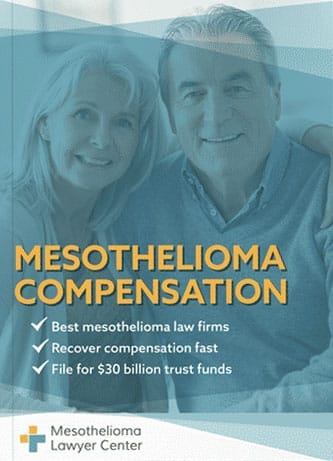Many Georgia industries once used asbestos at job sites, prompting workers and their families to seek the assistance of an experienced Georgia mesothelioma lawyer. People who worked around asbestos are at risk of developing malignant mesothelioma and other asbestos-related illnesses.
If you or a loved one have been diagnosed with mesothelioma, asbestos-related lung cancer, or asbestosis, you may be entitled to substantial compensation. We invite you to fill out our form today for a free Financial Compensation Packet, filled with information about experienced mesothelioma lawyers in Georgia, how to get paid in 90 days, how to file an asbestos trust fund claim, and much more.


FREE Financial Compensation Packet
- Info on law firms that will recover your HIGHEST COMPENSATION
- Learn how to get paid in 90 days
- File for your share of $30 billion in trust funds
We offer assistance to all asbestos victims and their families in Georgia, including cities such as:
Atlanta, Augusta, Columbus, Macon, Savannah, Athens, Sandy Springs, Roswell, Johns Creek, Albany, Warner Robins, Alpharetta, Marietta, Valdosta, Smyrna, Dunwoody, Rome, East Point, Milton, Gainesville, Hinesville, Peachtree City, Newnan, Dalton, Douglasville, Kennesaw, LaGrange, Statesboro, Lawrenceville, Duluth, Stockbridge, Woodstock, Carrollton, Canton, Griffin, McDonough, Acworth, Pooler, Union City, Decatur, Cartersville, Sugar Hill, Milledgeville, Snellville, Forest Park, Thomasville, St. Marys Tifton, Americus, Kingsland, Suwanee, Dublin, Fayetteville, Calhoun, Chamblee, Brunswick, Norcross, Riverdale, Conyers, Perry, College Park, Moultrie, Waycross, Winder, Powder Springs, Villa Rica, Fairburn, Monroe, Covington, Cusseta, Buford, Bainbridge, Lilburn, Grovetown, Dallas, Douglas, Cordele, Loganville, Vidalia, Richmond Hill, Jesup, Cairo, Cedartown, Fort Valley, Holly Springs, Jefferson, Fort Oglethorpe, Rincon, Thomaston, Fitzgerald, Garden City, Doraville, Toccoa, Braselton, Clarkston, Swainsboro, Centerville, Hampton, LaFayette, Auburn, and more.
Georgia Asbestos Facts

- Georgia recorded 4,172 deaths related to asbestos exposure between 1999 and 2017.
- Of those deaths, most were from lung cancer, but nearly 800 resulted from mesothelioma.
- The county with the greatest number of asbestos deaths is Fulton.
- Most asbestos exposure occurred on the job in various industries.
What Products Used Asbestos in Georgia, and What Impact Did It Have?
Asbestos found its way into a variety of products, especially during Georgia’s industrial boom. Primarily, it appeared in construction materials such as insulation, floor tiles, and roofing shingles. The automotive industry also utilized asbestos in brake pads and clutches due to its heat-resistant properties.
Moreover, shipbuilding and manufacturing facilities extensively used asbestos for its durability and fireproof nature. Its applications in equipment and machinery parts were widespread, given the perceived benefits at the time.
Impact of Asbestos Use
While these industries thrived economically, the health repercussions were severe and far-reaching. Workers in factories, construction sites, and shipyards often faced prolonged exposure to asbestos fibers. This exposure has been linked to chronic health issues, such as asbestosis, lung cancer, and mesothelioma.
The threat wasn’t confined to workplaces. Many residents found themselves exposed in their own homes through insulation and other construction materials. This residential exposure further expanded the circle of those at risk, impacting public health on a larger scale.
In essence, while asbestos may have contributed to industrial growth, it left a legacy of health challenges that resonate to this day.
Understanding Asbestos and Its Dangers
What is Asbestos?
Asbestos is a naturally occurring mineral known for its strong, fibrous structure. This mineral has been prized for its heat resistance and durability. Because of these properties, it found widespread use across several industries. Historically, asbestos was commonly incorporated into construction materials, such as insulation, roofing, and fireproofing. It’s also been a staple in manufacturing automotive components and materials for shipbuilding.
Why is Asbestos Dangerous?
The danger of asbestos lies in its microscopic fibers. When asbestos-containing materials are disturbed, these fibers can become airborne, making them easy to inhale or ingest. Once inside the body, the fibers lodge themselves in the lining of vital organs, such as the lungs, creating long-term health risks. Over time, this can lead to serious conditions, including asbestosis, lung cancer, and mesothelioma—a form of cancer predominantly linked to asbestos exposure. The symptoms of these illnesses may not appear for many years, making early detection and intervention difficult.
Key Points to Consider
- Health Risks: Asbestos exposure can cause life-threatening illnesses.
- Invisible Threat: Fibers are invisible to the naked eye, yet potent.
- Delayed Symptoms: Health effects may take decades to surface.
With its history of utility now overshadowed by its health implications, asbestos remains a pivotal topic in both health and safety discussions and regulatory measures worldwide.
Understanding the Link Between Asbestos Exposure and Mesothelioma
Asbestos exposure is the primary cause of mesothelioma, a severe and aggressive cancer. This disease develops when tiny asbestos fibers are inhaled or ingested. These fibers can become lodged in the lining of the lungs, abdomen, or heart. Over time, the fibers cause inflammation and scarring, which can lead to cellular damage.
The Pathway to Disease
- Initial Exposure: Individuals working in industries such as construction, shipbuilding, and manufacturing are often at higher risk. Asbestos was commonly used for its heat-resistant properties, making it prevalent in numerous materials.
- Latency Period: One of the challenges in diagnosing mesothelioma is its long latency period. Symptoms can take 20 to 50 years to manifest after exposure. This delay makes early detection difficult, as the disease often progresses unnoticed.
- Onset of Symptoms: Once symptoms do appear, they may include chest pain, shortness of breath, or abdominal swelling, depending on the location of the cancer. These symptoms can be mistaken for other conditions, further complicating timely diagnosis.
The Role of Asbestos Fibers
- Inhalation: When asbestos fibers are inhaled, they can penetrate lung tissues and create fibrous plaques over time. This persistent irritation contributes to the development of cancerous cells.
- Ingestion: In some cases, fibers can be ingested and embed themselves in the lining of the abdomen. This is typically associated with peritoneal mesothelioma.
By understanding these processes, we gain insight into why asbestos is so dangerous and why protective regulations, such as those endorsed by the Occupational Safety and Health Administration (OSHA), are crucial in preventing exposure.
Breaking down the journey from exposure to disease helps highlight the importance of early prevention and vigilance in recognizing symptoms.
Understanding Mesothelioma: Causes and Types
What Causes Mesothelioma?
Mesothelioma is a severe and currently incurable form of cancer. The primary cause is exposure to asbestos, a naturally occurring mineral once widely used in construction, insulation, and various industrial applications. This disease can take years, often decades, to manifest after initial exposure. Tiny asbestos fibers, when inhaled or ingested, can become trapped in the linings of the lungs, abdomen, or heart, eventually leading to tumors.
Types of Mesothelioma
- Pleural Mesothelioma
This type affects the pleura, the protective lining around the lungs. It is the most common form, accounting for about 75% of all mesothelioma cases. Symptoms might include chest pain, persistent cough, and difficulty breathing. - Peritoneal Mesothelioma
Found in the peritoneum, the lining of the abdominal cavity, this type is responsible for roughly 20% of cases. Symptoms often involve abdominal pain, swelling, and weight loss. - Pericardial Mesothelioma
This rare form affects the pericardium, the lining around the heart. It accounts for about 1% of cases and can lead to heart-related symptoms such as chest pain and arrhythmias.
Understanding these causes and types can aid in earlier detection and more effective management of this challenging disease. If you suspect exposure or experience related symptoms, consult a healthcare professional immediately. Your health is paramount, and awareness is the first step towards prevention.
When Do I Need a Georgia Mesothelioma Lawyer?
If you or a family member suffered asbestos exposure and received a diagnosis of asbestos-related illness, contact a mesothelioma lawyer for advice. Even if you only suspect exposure occurred, talk to a lawyer.

An expert in asbestos and personal injury laws can help you:
- Understand your legal options
- Make the best choice for getting justice or compensation
- Get the most compensation possible
- Face big companies responsible for your exposure
- File a lawsuit or make a claim with an asbestos trust fund
- File for VA benefits if you served in the military
Victims like you sue for mesothelioma to recover damages. Mesothelioma is an expensive illness that could and should have been prevented. A lawyer helps you hold companies accountable and makes them pay.
Asbestos-related illnesses often lead to significant financial struggles. Patients face overwhelming costs due to medical bills that continue to mount. The inability to work results in lost wages, further straining finances. Families suffer too, bearing the burden of funeral expenses and enduring the loss of financial support from loved ones. These challenges add to the emotional toll, creating a cycle of hardship.
By seeking legal assistance, you not only pursue justice but also aim to alleviate these financial burdens. Legal action can provide compensation for these struggles, offering you and your family a way to reclaim stability.
How to File a Mesothelioma Claim in Georgia
A top Georgia mesothelioma lawyer will help determine the type of claim to file. They file for you and take all the steps necessary to give you the best chance of winning compensation. Options include:
Mesothelioma Personal Injury Lawsuit
Mesothelioma is considered a personal injury because it results from negligent asbestos exposure. To file and win a lawsuit, you need to prove that asbestos caused your illness and that specific defendants are liable for that exposure.
Finding evidence and proving a mesothelioma lawsuit is complicated. This is why you must rely on a lawyer or firm with extensive resources and experience working on and winning asbestos cases.
Asbestos Trust Fund Claim
If the companies that exposed you to asbestos went bankrupt, you cannot sue them. Instead, you can file a claim for compensation with an asbestos trust fund. Asbestos trusts have more than $30 billion in funds for claimants.
Your lawyer can determine which companies exposed you to asbestos. They can then decide which trusts you are eligible to make a claim with.
Mesothelioma Wrongful Death Lawsuit
If you lost a loved one to mesothelioma, you can file a lawsuit over their wrongful death. The companies responsible for their asbestos exposure can be held liable for monetary damages, just as in a personal injury case.
Where Was I Exposed to Asbestos in Georgia?

If you have mesothelioma now, you were most likely exposed to asbestos decades ago. Most people were exposed to asbestos at their jobs. Many industries used asbestos for years without warning workers of the risks.
An experienced asbestos attorney in Georgia has the resources and expertise necessary to determine where and when you came into contact with asbestos.
These are just a few examples of companies and industries in Georgia that exposed workers to asbestos:
Asbestos Mines
Georgia contains 52 natural asbestos deposits, more than any other state in the eastern U.S. and primarily in the mountains in the north. Georgia was also home to the first asbestos mine in the country.
Georgia would continue mining asbestos at several sites from the late 1800s through the early 1900s. The mines supplied numerous industries and put miners at risk of exposure.
The former asbestos mines pose much less of a threat today but can still harm residents. If natural asbestos is disturbed, for instance, by construction or road projects, the fibers can enter the air, soil, and water. This can harm anyone living in the area.
Georgia-Pacific
Georgia-Pacific, one of the state’s biggest companies, is well-known for using asbestos-containing materials (ACMs) in many products. Employees handled these materials daily. Additionally, Georgia-Pacific bought out the Bestwall Gypsum Corporation during the 1960s’, which used asbestos.
According to the Georgia-Pacific newsroom, in 2000, 232,000 asbestos-related cases have been filed against the company since the mid-1980s.
Although the company claimed it did not anticipate any other lawsuits in the same news statement, it put aside an additional $221 million in 2002 for asbestos-related lawsuits. In 2002, the company had more than 62,000 pending asbestos lawsuits.
The Keebler Company
Many manufacturing plants also used asbestos. In 1989, the Keebler Company in Atlanta was responsible for exposing thousands of workers to asbestos fibers after the Centers for Disease Control (CDC) determined that an oven in one of the company’s plants was releasing the harmful fibers into the air.
Military Sites and Government Buildings
Georgia is home to 13 military bases and several Federal buildings. These military and federal workplaces have been found to contain asbestos.
Veterans have some of the highest rates of mesothelioma in the U.S. The military used asbestos extensively in buildings, vehicles, and machinery.
U.S. Navy veterans were most affected by asbestos use in the military. Ships contained asbestos in nearly every component for decades.
Other Job Sites Associated with Asbestos in Georgia
- Charmin Paper Products Company
- Coats & Clark, Inc.
- Cobb Heating & Air Conditioning
- Coil Insulation Company
- Firestone Tire and Rubber Company
- Georgia Alabama Power Company
- Georgia Growers Distilling Company
- Georgia Power Company
- Herck & Company
- J.P. Stevens and Company
- Lykes Brothers Inc
- Merck & Company, Inc.
- Merck Chemical Div
- Miller Brewing Company, Inc
- Georgia Plywood Corporation
- J. P. Stevens & Company
- Mohasco Industries Inc.
- Southeast Paper Manufacturing Company
- Brumby Chair Company
- Dobbins Air Force Base
- Georgia Manufacturing and Public Service Company
- Kennesaw Mills Company
- Kerby Saunders Incorporated
- Mckenney’s, Inc.
- Mead Container Packaging
- Mead Paper Company
- Mechanical Associates
- Merillat Industries
- Metropolitan Eye Hospital
- Miss Georgia Dairies
- Hickory Lake Apartments (Smyrna)
- Lawrenceville High School
- Jekyll Island Historical Power Plant
- Cowboys (Kennesaw)
Georgia Laws That Affect Asbestos Cases
Each state has its own laws regarding asbestos litigation and claims. Understanding the laws that impact victims filing a lawsuit and recovering damages is important. Because some of these laws make it more difficult to succeed, relying on an experienced asbestos firm is essential.
Statute of Limitations

The statute of limitations sets a deadline for filing lawsuits related to personal injury or wrongful death in Georgia:
- Under Ga. Code Ann. § 9-3-20 et seq., plaintiffs filing an asbestos-related lawsuit in the state of Georgia must file within two years of the time of diagnosis or within two years of when the illness was discovered.
- Wrongful death lawsuits follow the same two-rule; the lawsuit must be filed within two years of the date of the victim’s death.
- Georgia allows asbestos-related cases to be consolidated as defined in Rule 42 (a) of the Federal Rules of Civil Procedure.
2005 Asbestos Litigation Reforms
The Georgia Supreme Court mandated new restrictions in 2005 that make filing and winning an asbestos-related lawsuit more challenging for victims:
- In the past, asbestos victims had to prove that asbestos contributed to their disease, but now it must also be proven to be a substantial contributing factor and the primary cause of a disease.
- A medical report must be presented, approved by a physician, that states the victim’s disease came from asbestos exposure. This rule applies to all asbestos-related diseases except for mesothelioma.
- A physician must also verify that it has been at least 15 years have passed between the victim’s first exposure to asbestos and the diagnosis.
- Victims can only file if they are currently a resident of Georgia and/or were a resident at the time of asbestos exposure.
Take-Home Duty for Secondhand Asbestos Exposure
Most people with mesothelioma were directly exposed to asbestos at work. Some people experienced secondhand asbestos exposure when a family member who worked with it brought fibers home on their clothing.
Some states have recognized that companies had a duty to warn employees of this risk. Georgia does not recognize that duty, known as take-home duty.
The Georgia Supreme Court ruled that CertainTeed did not have a duty to warn in a 2016 lawsuit. The victim developed mesothelioma because her father worked at CertainTeed and brought asbestos fibers home without understanding the risks.
What Are Georgia’s Asbestos Safety Laws?
The Environmental Protection Division (EPD) of the Georgia Department of Natural Resources (DNR) is responsible for the state’s laws governing asbestos and asbestos abatement projects in Georgia.
- Rule 391-3-4-.04 (8) of the Georgia Department of Natural Resources Rules mandates that any “asbestos-containing waste” must be transported for disposal in a state-approved vehicle that has a separate compartment area to transport the asbestos in.
- The asbestos must be disposed of in permitted landfills and waste areas within the state.
- Each container with asbestos must be sealed tight with the proper warning labels on the front.
- All friable asbestos must be “wetted” before removing it from the asbestos abatement project area. The asbestos must remain wet while encapsulating it for proper disposal.
- Written notification must be sent to the state within seven days before starting any asbestos abatement project in Georgia.
For more detailed information and additional regulations involved in Georgia asbestos abatement, contact the EPD at 404-657-5947 or toll-free at 888-373-5947.
A recent investigation by 11Alive News in Atlanta uncovered issues with enforcing these regulations. The news agency found that lawmakers largely defunded the program in 2011.
They also found that the Georgia DNR rarely checks on violations of the state’s asbestos laws. Before the defunding, the agency found and acted on numerous violations. This lack of accountability puts residents at risk of harmful asbestos exposure and leads to more lawsuits.
Understanding the Life Expectancy for Mesothelioma Patients
Mesothelioma is an aggressive cancer with a generally challenging prognosis. However, the outlook varies significantly based on several factors, including the type and stage of the disease at diagnosis.
Life Expectancy Factors:
-
Type of Mesothelioma:
- Peritoneal Mesothelioma: Patients typically have a better prognosis compared to other types. Many can live more than three years following diagnosis.
- Pleural Mesothelioma: This is the most common form and often has a shorter life expectancy, usually ranging from 12 to 21 months depending on intervention success.
-
Stage at Diagnosis:
- Early Stages (I-II): If identified early, patients may experience a longer life expectancy due to more effective treatment options.
- Later Stages (III-IV): Advanced stages are often harder to treat, resulting in a reduced survival rate.
-
Treatment Options:
- Various treatments, including surgery, chemotherapy, and radiation, can extend life expectancy by managing symptoms and slowing disease progression.
- Emerging therapies and clinical trials continue to offer hope for extending life even further.
-
Overall Health and Age:
- Younger patients with no additional health issues often have a more favorable outcome.
While there is no cure for mesothelioma, advances in treatment offer the opportunity to enhance both the quality and length of life for many patients. Early diagnosis remains crucial in improving life expectancy and increasing the likelihood of long-term survival.
Mesothelioma Treatment in Georgia
Victims dealing with an asbestos-related disease and finding the best mesothelioma treatments can be daunting. The National Cancer Institute (NCI) makes this process easier by appointing worthy care centers and hospitals as NCI-designated facilities.
The Winship Cancer Institute at Emory University (WCI) is an NCI-designated care center with researchers, physicians, cancer experts, and healthcare specialists focusing on mesothelioma and other asbestos-related diseases.
It’s important to seek mesothelioma treatment from a care center specializing in asbestos-related diseases. A typical small family clinic or a general practitioner usually doesn’t have the expertise and knowledge of a physician specializing in asbestos cancer.
Common Symptoms of Mesothelioma
Mesothelioma is a rare and aggressive cancer primarily caused by asbestos exposure. Recognizing its symptoms early can lead to better management and treatment. Here are some of the typical symptoms associated with different types of mesothelioma:
- Pleural Mesothelioma (affecting the lungs):
- Persistent chest pain
- Difficulty breathing
- Chronic cough
- Unexplained weight loss
- Fatigue
- Peritoneal Mesothelioma (affecting the lining of the abdomen):
- Abdominal pain or swelling
- Bloating
- Nausea and digestive issues
- Changes in bowel habits, such as constipation or diarrhea
- Loss of appetite
- Pericardial Mesothelioma (affecting the heart lining):
- Heart palpitations or irregular heartbeat
- Chest pain
- Shortness of breath
- Testicular Mesothelioma (extremely rare):
- Swelling or lumps in the testicular area
- Pain in the groin region
These symptoms can often be mistaken for other conditions, which makes accurate diagnosis challenging. If you suspect exposure to asbestos or exhibit these symptoms persistently, it’s crucial to consult a healthcare professional for a thorough evaluation. Early detection can significantly influence treatment options and outcomes.
Mesothelioma, an aggressive cancer linked to asbestos exposure, presents a daunting prognosis. The five-year survival rate for individuals diagnosed with this condition is approximately 10%. This statistic underscores the severity of the disease, as many patients face a drastically limited life expectancy, typically ranging from four to 18 months post-diagnosis.
Paul at Mesothelioma Lawyer Center provided outstanding support when my family faced a mesothelioma diagnosis. From the start, his professionalism and genuine care were evident. Paul explained every step of the legal process with patience and empathy.
–Patrick M
His meticulous attention to detail and expertise ensured our case was handled swiftly and efficiently. What truly impressed us was Paul’s responsiveness—he was always quick to reply and kept us well-informed throughout.
I highly recommend Mesothelioma Lawyer Center.
Getting Legal Help in Georgia
As previously mentioned, if you’ve been diagnosed with mesothelioma, asbestos-related lung cancer, or asbestosis, you may be entitled to compensatory damages. Don’t forget to fill out our form to get our free Financial Compensation Packet, filled with information on the experienced asbestos and mesothelioma attorneys in your area. For questions and assistance, feel free to contact us at 800-793-4540.

Paul Danziger
Reviewer and EditorPaul Danziger grew up in Houston, Texas and earned a law degree from Northwestern University School of Law in Chicago. For over 25 years years he has focused on representing mesothelioma cancer victims and others hurt by asbestos exposure. Paul and his law firm have represented thousands of people diagnosed with mesothelioma, asbestosis, and lung cancer, recovering significant compensation for injured clients. Every client is extremely important to Paul and he will take every call from clients who want to speak with him. Paul and his law firm handle mesothelioma cases throughout the United States.
References
- Environmental Working Group. (n.d.). Asbestos-Related Deaths in Georgia.
Retrieved from: http://www.asbestosnation.org/facts/asbestos-deaths/ga/ - Emory Winship Cancer Institute. (n.d.). Lung Cancer.
Retrieved from: https://winshipcancer.emory.edu/lung-cancer/WinshipContentPage.aspx?nd=689 - Environmental Working Group. (n.d.). Asbestos: Think Again.
Retrieved from: http://www.ewg.org/research/maps/deaths-due-asbestos-related-diseases - Van Gosen, B.S. (2006). Reported Historic Asbestos Mines, Historic Asbestos Prospects, and Natural Asbestos Occurrences in the Eastern United States.
Retrieved from: http://pubs.usgs.gov/of/2005/1189/ - The New York Times. (2002, January 25). Company News; Georgia-Pacific Sets Aside Money for Asbestos Claims.
Retrieved from: http://www.nytimes.com/2002/01/25/business/company-news-georgia-pacific-sets-aside-money-for-asbestos-claims.html - Malone, K. (2011, February 3). Hickory Lake Apartments Not Yet Empty. Marietta Daily Journal.
Retrieved from: https://www.mdjonline.com/news/hickory-lake-apartments-not-yet-empty/article_47055920-a4cd-54d0-b55d-ce7484308d8e.html - JD Supra. (2022, February 14). Jurisdictional Analysis Shows Divide on Duty for Take-Home Asbestos Exposure.
Retrieved from: https://www.jdsupra.com/legalnews/jurisdictional-analysis-shows-divide-on-5674470/
